Menu
FAQ: MSN Family Nurse Practitioner Degree

Family nurse practitioners (FNPs) are RNs who specialize in primary care and take a more active role in managing their patients' health. If you've ever visited a clinic or urgent care facility with a nurse practitioner for a physical exam or to treat a condition, you've no doubt experienced the comprehensive range of care these skilled medical professionals provide.
FNPs are not physicians, but they do have some of the same responsibilities as primary care doctors and often work alongside them. They must be ready to handle everything from health promotion and screening to managing illness and disease, but holistic health assessment is at the core of their practice.
If you've considered advancing your nursing skills by becoming a family nurse practitioner, the questions and answers that follow will provide all of the information you need to get started. The links below can also help you navigate the way to a new career.
What is a Master of Science in Nursing – Family Nurse Practitioner Degree?
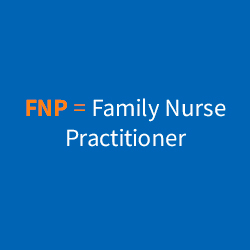
The MSN – FNP is a graduate degree specifically for RNs who wish to become a board-certified family nurse practitioner (FNP), an advanced practice registered nurse specializing in primary care and general medicine. It gives registered nurses the knowledge and clinical skills they need to move into the role of primary care provider, seeing and treating patients in family practice, internal medicine or health clinic settings. FNPs also work in public health departments and for nonprofit and government agencies.
Why Should RNs Consider Getting Their MSN – FNP?

The MSN – FNP is a graduate degree specifically for RNs who wish to become a board-certified family nurse practitioner (FNP), an advanced practice registered nurse specializing in primary care and general medicine. It gives registered nurses the knowledge and clinical skills they need to move into the role of primary care provider, seeing and treating patients in family practice, internal medicine or health clinic settings. FNPs also work in public health departments and for nonprofit and government agencies.
FNPs work with patients across the lifespan in a sustained and collaborative care process that can include family members and caregivers as well. Helping patients improve or maintain their health is the ultimate goal, and one that can sometimes be best achieved through this type of primary care relationship.
As physician shortages continue to impact patients in both urban and rural healthcare settings, demand for nurse practitioners also remains high, offering excellent career prospects.
—Christina Garcia, UTA online MSN – FNP program graduate
What Will I Learn In a Special Education Master's Program?
Online MSN – FNP programs are designed to help RNs acquire the full range of diagnostic, clinical and research expertise required to manage healthcare for the broad scope of patients that primary care medicine encompasses. Coursework usually centers on three areas:
- Evidence-based primary care (wellness and health management across the patient lifespan)
- Advanced practice (diagnosis, assessment, pharmacology, research, clinical management)
- Experiential learning (supervised clinical experience in the field)
UTA's online MSN – FNP program features a comprehensive range of coursework and clinicals that prepare graduates to achieve board certification after graduation.
What's Different About Earning an MSN – FNP Degree Online?

The biggest difference you'll experience compared to an on-campus program is that you have more freedom to fit your degree to your needs. Since the bulk of your coursework is completed online, it's easy to do assigned readings, watch video lectures and complete projects on your schedule. Courses are also shorter so you can move through the degree requirements faster.
Online study is often the best way for nurses who work split shifts, overnight, or on-call to get a graduate degree because students can log into their courses 24/7. Clinicals can also be supervised and completed in your community for maximum convenience.
The University of Texas at Arlington's online MSN – Family Nurse Practitioner program is designed for working RNs. The program's accelerated courses and flexibility can help you earn a graduate degree on your schedule.
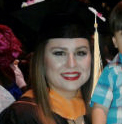
—Adrienne Villarreal, UTA online MSN – FNP program graduate
How Do Clinicals Work in an Online Nurse Practitioner Program?

Because many online MSN – FNP students attend a nursing program in a different city or state, students often set up their own clinical learning experiences with the approval of their school. Many students find this to be a significant advantage, since they get to choose their location and a local preceptor to supervise.
It's best to make and confirm arrangements for each clinical rotation several months prior to the designated start date. This ensures there is adequate time to submit all required paperwork, and for the school to review the preceptor's qualifications and approve the arrangement.
What Are the Admission Requirements for MSN – FNP Programs?
MSN – FNP program admission requirements vary by school, but most ask for a Bachelor of Science in Nursing from an accredited program, with a minimum undergraduate GPA that meets the school's admission standards. Other requirements typically include:
- An active and unencumbered nursing license
- Several years of RN experienc
- Transcripts from all previous schools attended
- An undergraduate statistics course (usually with a grade of C or better)
Some programs may ask for GRE scores, recommendation letters or a statement of purpose as well.
In addition to an active/unencumbered RN license, UTA's online MSN – FNP program requires at least two years of clinical experience, a 3.0 undergraduate GPA, and a BSN from an ACEN- or CCNE-accredited program at a regionally accredited school. You can find additional application requirements, including specific information for international and probationary student admissions, on the UTA online program site.
Why Is Accreditation Important for Nursing Programs?
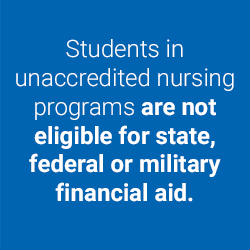
Nursing school accreditors include the Commission on College Nursing Education (CCNE) and the Accrediting Commission for Education in Nursing (ACEN). Their review process ensures that nursing programs are providing an appropriate professional education. The process also helps confirm that graduating nurse practitioners have the right qualifications for safe and ethical patient care, and that program curricula correlates with current licensing.
Some of the risks associated with earning a nursing degree from an unaccredited institution include lack of access to federal financial aid, course credits that may not transfer to other schools, and limited career options due to strong employer preference for degrees from accredited programs.
All nursing programs in UTA's College of Nursing and Health Innovation have CCNE accreditation.
What Is the Career Outlook for Family Nurse Practitioners?
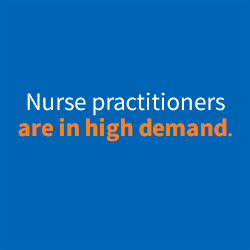
According to the U.S. Bureau of Labor Statistics, the job market for nurse practitioners of all types is robust and growing. The evolving scope of practice and prescribing authority for nurse practitioners is also changing the way primary care is delivered in many areas of the nation. More FNPs are being recruited across the spectrum of primary care, and they are working with patients on a broader range of health issues.
There is also a critical need for FNPs in rural and remote areas of the country, where the shortage of primary care physicians is even more acute than in cities. FNPs are regularly recruited to practice in the Health Professional Shortage Designation areas outlined by the U.S. Health Resources and Services Administration (HRSA). They may also work with underserved populations in settings such as community clinics, state mental hospitals or correctional facilities.
All of these factors are driving up salaries for FNPs as well. BLS notes that the median annual wage for nurse practitioners is over $120,000.
Can I Practice Anywhere in the U.S. Once I Earn My FNP Degree?
Yes, but the scope of practice allowed can vary. National board certification is required to work anywhere in the U.S. or its territories, and according to the American Association of Nurse Practitioners, FNPs can practice independently in more than half of states at present. However, many state legislatures still impose certain restrictions.
In some states FNPs have "full practice" authority with a level of independence comparable to physicians. In other states, FNPs can transition to independent practice after logging a specified number of licensed work hours. In some state, FNPs have "restricted practice," which means their work must be supervised by a physician or a healthcare team.
Laws governing nurse practitioner authority are changing rapidly however. The U.S. Veteran's Administration, which is the largest employer of nurses in America, has granted full practice authority to all of the nurse practitioners across its system, and many states are moving that direction. The Scope of Practice Policy project is one resource helping FNPs monitor this progress.
Are There Financial Incentives to Practice in Health Professional Shortage Designation Areas?
Yes. In fact, FNP is one of the key health occupations HRSA has targeted to help fill the critical need for primary care providers across America. Incentives such as scholarships and loan repayment are available to eligible FNPs working with underserved populations in specific geographic areas. Your state primary care office can provide additional information.
Check out some of these resources to learn more about financial incentives for FNPs:
How Much Will It Cost to Get My MSN – FNP Degree Online?

The cost of any nursing degree depends on many variables, including the number of credit hours and clinical rotations required to graduate. Earning your MSN – FNP online may be less expensive than on-campus programs, and public colleges and universities tend to be more affordable than private institutions. If you're interested in a program that's not in the state where you live, be sure to check whether out-of-state tuition will apply as well.
The quality and reputation of your graduate program is also important to consider, to ensure you're getting the best career value from your investment in an advanced degree.
With a total tuition cost of $30,084, UTA's MSN – FNP online program is affordable and convenient. You can pay by the course as you move through the program, at a pace that fits your budget and schedule. All students in UTA's online MSN – FNP program also pay the same tuition rate, regardless of location.
Is Financial Aid Available to Online Graduate Students?

Yes. Students enrolled in accredited online MSN – FNP programs have access to the same state and federal financial aid programs as on-campus students. This can include grants and loans, as well as any nursing scholarships your school may offer.
UTA's searchable Mav ScholarShop database provides information on scholarships for students in the College of Nursing and Health Innovation.
Many healthcare employers also provide tuition reimbursement or other education benefit programs designed to help RNs complete an advanced degree. For example, UTA offers affiliate scholarships for employees of its more than 600 partner hospitals and health systems, as well as tuition reimbursement. If you work at a UTA-affiliated healthcare facility, check with your employer for further details.
Can I Use My Military Benefits for an Online MSN – FNP Degree?

Yes, in most circumstances. Check with your branch of the armed forces to verify your eligibility and any restrictions concerning your degree plans. The school and program you choose must be accredited, but as long as you are eligible to use the GI Bill or other military benefits to pay for college, you should be able to use them for an online MSN – FNP degree.
Military and Veteran Services at UTA can help you with certifying benefits and applying them to the cost of your education.
How Fast Can I Earn My MSN – FNP Degree?
Most students can earn their degree in three years or less, but much depends on you. Factors include whether you attend full or part time, the curriculum requirements, the number of courses you take each term and the amount of time you will spend in clinical rotations.
Students can complete UTA's online MSN – FNP program in as few as 32-36 months, which includes the clinical requirement.
Can I Earn My Online MSN – FNP Degree While Working Full Time?

Yes. Getting a graduate degree is a commitment, and adequate time for learning and study is required to do well. However, the great thing about online MSN – FNP programs is that they are designed to work for you, and with your schedule.
Keep your job and study whenever and however you learn best – whether that entails reading a chapter on the train to work or doing homework over a late-night snack. Or maybe catching up on the weekend is more your style. Just fit the degree to your time and pace.
Is It Possible for Online Students to Do Clinicals On Campus?
Maybe, but it's less likely when you earn your MSN – FNP degree online. If you reside in the area where a program you are considering has a physical campus, check if that's possibility before you apply. Some schools can provide this option at an affiliated ambulatory or on-campus clinic.
It's much more common for online students to do clinicals in their own community. Students in the UTA online MSN – FNP program arrange their own clinicals, usually at a primary care or clinic site in their local area.
How Are Nursing Courses Taught Online?
If you've ever used the internet to attend a nursing workshop remotely or take a course for CEU credit, you're probably familiar with the basics of online learning. Aside from clinicals, all coursework in MSN – FNP programs happens in the virtual classroom, and all you have to do is log into your course to find the materials you need. Your class syllabus, lectures and assignments will be organized there. You'll see all applicable deadlines and you'll also use course tools to submit completed work and contribute to discussion boards.

—Kudirat Sunmonu, UTA MSN – FNP online program graduate
Will I Study With Professors Who Have Clinical Experience?
Yes. Professors who teach MSN – FNP courses online are master's- and doctoral-trained nurses who bring years of professional clinical experience to their work with students. One important requirement in nursing school accreditation is that faculty members have the knowledge and skills to meet current standards for the profession, which includes relevant work experience in the subject areas they teach.
How Accessible Are Nursing Professors in Online Courses?
You may actually find professors in online MSN – FNP programs more accessible than you've been used to in traditional on-campus courses, simply because the virtual classroom is a more fluid teaching environment. It's open for learning 24/7, and though professors don't quite work that schedule, they are accustomed to dealing with students who need flexibility and value independent study.
Online nursing professors also have a relationship with students that is built around an ongoing dialogue rather than gathering at a regular place and time, though online lectures are a great opportunity to get that feeling of being in the classroom too. Professors are often more available to meet by video chat or phone outside of standard business hours as well.
Will I Be In Class With Other RNs Online?
Yes. Students getting their MSN – FNP online often forge strong relationships with peers who are taking courses and moving through the degree program at the same time. Discussion boards, collaborative assignments and study groups offer many opportunities to interact with other nurses and share experiences throughout the journey to FNP.
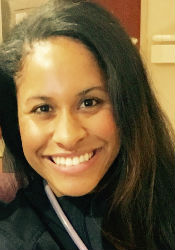
—Kayla Johnson, UTA MSN – FNP online program graduate

—Kudirat Sunmonu, UTA MSN – FNP online program graduate

Are There Support Services for Online Nursing Students?
Check with any nursing program you may be considering to learn more about the support and services they offer for online students, as this can vary by institution.
UTA MSN – FNP online students have access to many of the same support systems that their on-campus peers enjoy, such as advising, academic coaching and tutoring. The UTA Writing Center offers online appointments as well, and UTA library services include live online chat with a librarian.
What Are the Technology Requirements For Online Courses?

Taking courses online requires consistent access to a computer (laptop, desktop or tablet) with an operating system that is fairly up to date. You'll also need email as well as software or applications that can handle your word processing, spreadsheet and presentation needs.
A webcam and microphone will be necessary for video chatting. In addition, check to make sure you have the latest version of your web browser, along with adequate internet streaming speed for watching videos online.
Why Should I Choose UTA?
UTA is a pioneer in online nursing education, with a history of producing successful and skilled family nurse practitioners. MSN – FNP online students receive a degree that builds their expertise as working professional nurses and increases their value on the job market. Graduates also benefit from a lifelong connection to UTA's College of Nursing and Health Innovation, which is focused on healthcare quality and new research in the field.